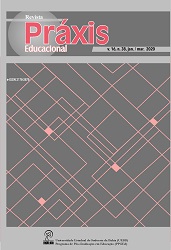“A MANIFEST FOR BRAZILIAN WOMEN”: FEMININE GROUP OF SOCIAL STUDIES AND WOMEN’S PARTICIPATION IN THE PRESS
DOI:
https://doi.org/10.22481/praxisedu.v16i38.5989Keywords:
Women’s Emancipation, Press, Teaching professionAbstract
The objective of this work is to analyze the performance of teachers in the Rio press in the context of the First Republic. For that, it was necessary to understand the conditions and norms in which the women were subject in that period. From the elucidation of the role attributed to women, it was possible to perceive that the teaching profession has become an important space of female occupation. In this sense, the “Manifest to the Brazilian Woman”, published in the newspaper Voz do Povo in 1920 by the Women’s Social Studies Group, was selected as the guiding principle of the study, with the presence of female teachers in its composition. Among the contents included in the manifest were the discussions on “women’s emancipation”, aimed at freeing women from the "various forms of bondage" to which they were subjected. In order to problematize the debate held, we also sought to analyze the visibility given to the discourses of teachers in the newspapers Correio da Manhã and A Razão. The research allowed to observe relevant aspects of the experience of women taken as subjects of the history of that historical moment.
Downloads
References
ARAUJO, Rosa Maria Barboza de. A Vocação do Prazer: a cidade e a família no Rio de Janeiro republicano. Rio de Janeiro, Rocco, 1993.
CERTEAU, Michel de. A invenção do cotidiano: Artes de Fazer. 22 ed. Petrópolis, RJ: Vozes, 2014.
CHALHOUB, Sidney. Trabalho, lar e botequim: o cotidiano dos trabalhadores no Rio de Janeiro da Belle époque. 3.ed. Campinas, SP: Editora da Unicamp, 2012.
CORREIO DA MANHÃ. Disponível em: <http://memoria.bn.br/DocReader/docmulti.aspx?bib=089842&pesq=>. Acesso em: 19 jan. 2019.
FRACCARO, Glaucia Cristina Candian. Os Direitos das Mulheres: Organização Social e Legislação Trabalhista no Entreguerras Brasileiro (1917-1937). Tese de Doutorado em História. Unicamp, 2016.
GARZONI, Lerice de Castro. Arena de combate: gênero e direitos na imprensa diária (Rio de Janeiro, início do século XX). Tese (Doutorado em História Social), UNICAMP, Campinas, 2012.
GINZBURG, Carlo. A micro história e outros ensaios. Lisboa: DIFEL, 1990.
GOMES, Ângela de Castro. A Invenção do Trabalhismo. 3 ed. Rio de Janeiro: Editora FGV, 2005.
MACIEL, Laura Antunes. Imprensa, esfera pública e memória operária - Rio de Janeiro (1880-1920). Revista de História. (São Paulo), n. 175, p. 415-448, jul-dez., 2016.
NICOLETE, Jamilly Nicácio; ALMEIDA, Jane Soares de. Professoras e rainhas do lar: o protagonismo feminino na imprensa periódica (1902-1940). Educar em Revista, Curitiba, v.33, n. especial 2. p. 203-220, set. 2017.
SCHUELER, Alessandra Frota Martinez de. Representações da docência na imprensa pedagógica na Corte Imperial (1870-1880): o exemplo da Instrução Pública. Educação e Pesquisa (USP), São Paulo, v. 31, n.3, p. 379-390, 2005.
SODRÉ, Nelson Werneck. História da imprensa no Brasil. Rio de Janeiro: Ed. Mauad, 1999
THOMPSON, Edward Palmer. A Miséria da Teoria ou Um Planetário de Erros. Trad.: Waltensir Dutra. Rio de Janeiro: Zahar Editores. 1981.
THOMPSON, Edward Palmer. As peculiaridades dos ingleses. In: NEGRO, Antônio Luigi; SILVA, Sérgio (orgs.). E.P. Thompson. As peculiaridades dos ingleses e outros artigos. Campinas, SP: Editora da Unicamp, 2001.
VOVELLE, Michel. Ideologias e mentalidades. São Paulo: Brasiliense, 2004.
VOZ DO POVO. Disponível em: <http://memoria.bn.br/DocReader/DocReader.aspx?bib=720003&PagFis=0>. Acesso em: 19 jan. 2019.
Downloads
Published
How to Cite
Issue
Section
License
Você é livre para:
Compartilhar - copia e redistribui o material em qualquer meio ou formato; Adapte - remixe, transforme e construa a partir do material para qualquer propósito, mesmo comercialmente. Esta licença é aceitável para Obras Culturais Livres. O licenciante não pode revogar essas liberdades, desde que você siga os termos da licença.
Sob os seguintes termos:
Atribuição - você deve dar o crédito apropriado, fornecer um link para a licença e indicar se alguma alteração foi feita. Você pode fazer isso de qualquer maneira razoável, mas não de uma forma que sugira que você ou seu uso seja aprovado pelo licenciante.
Não há restrições adicionais - Você não pode aplicar termos legais ou medidas tecnológicas que restrinjam legalmente outros para fazer qualquer uso permitido pela licença.












